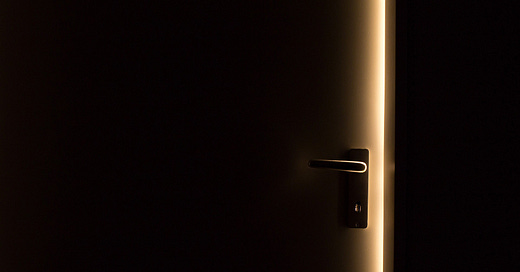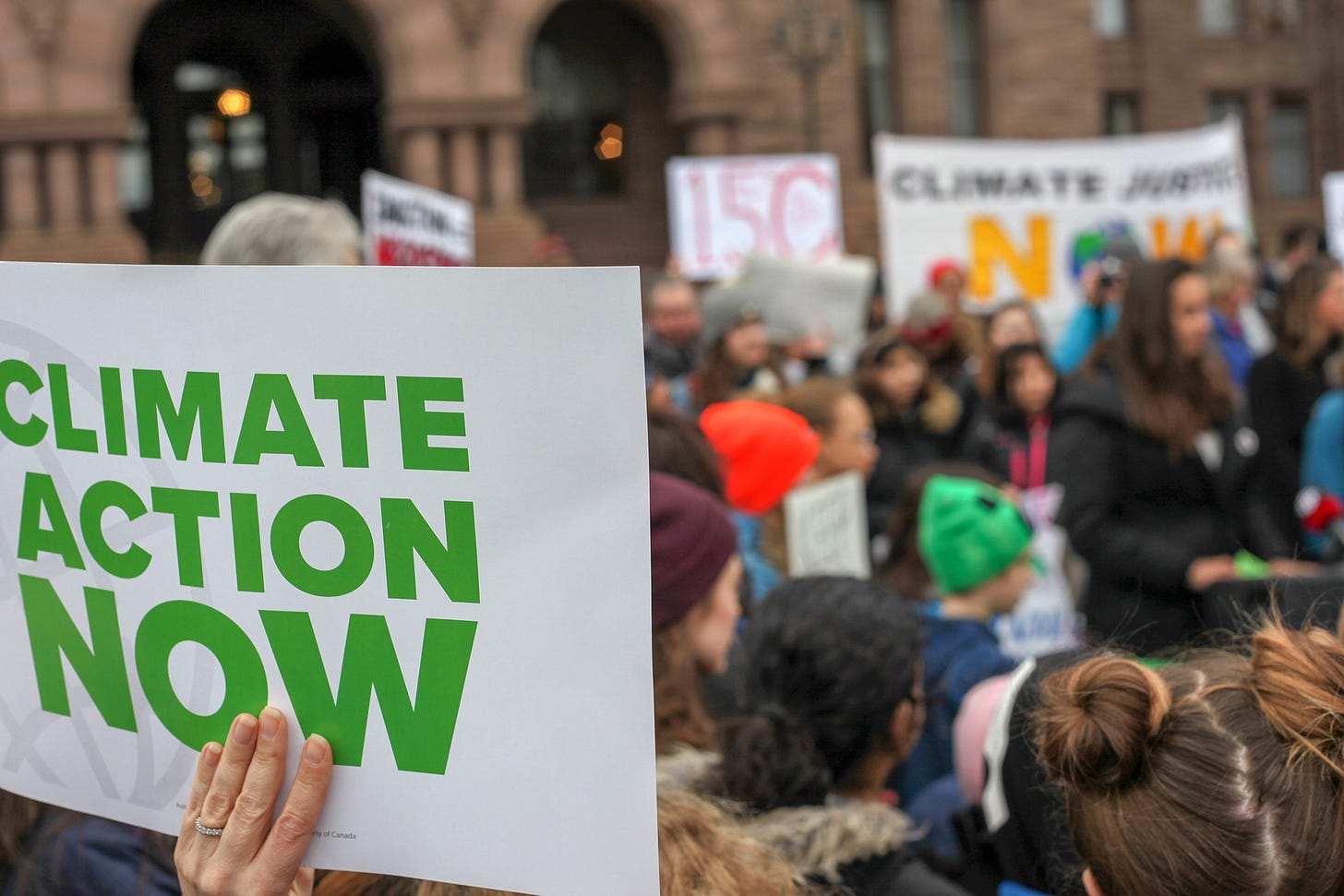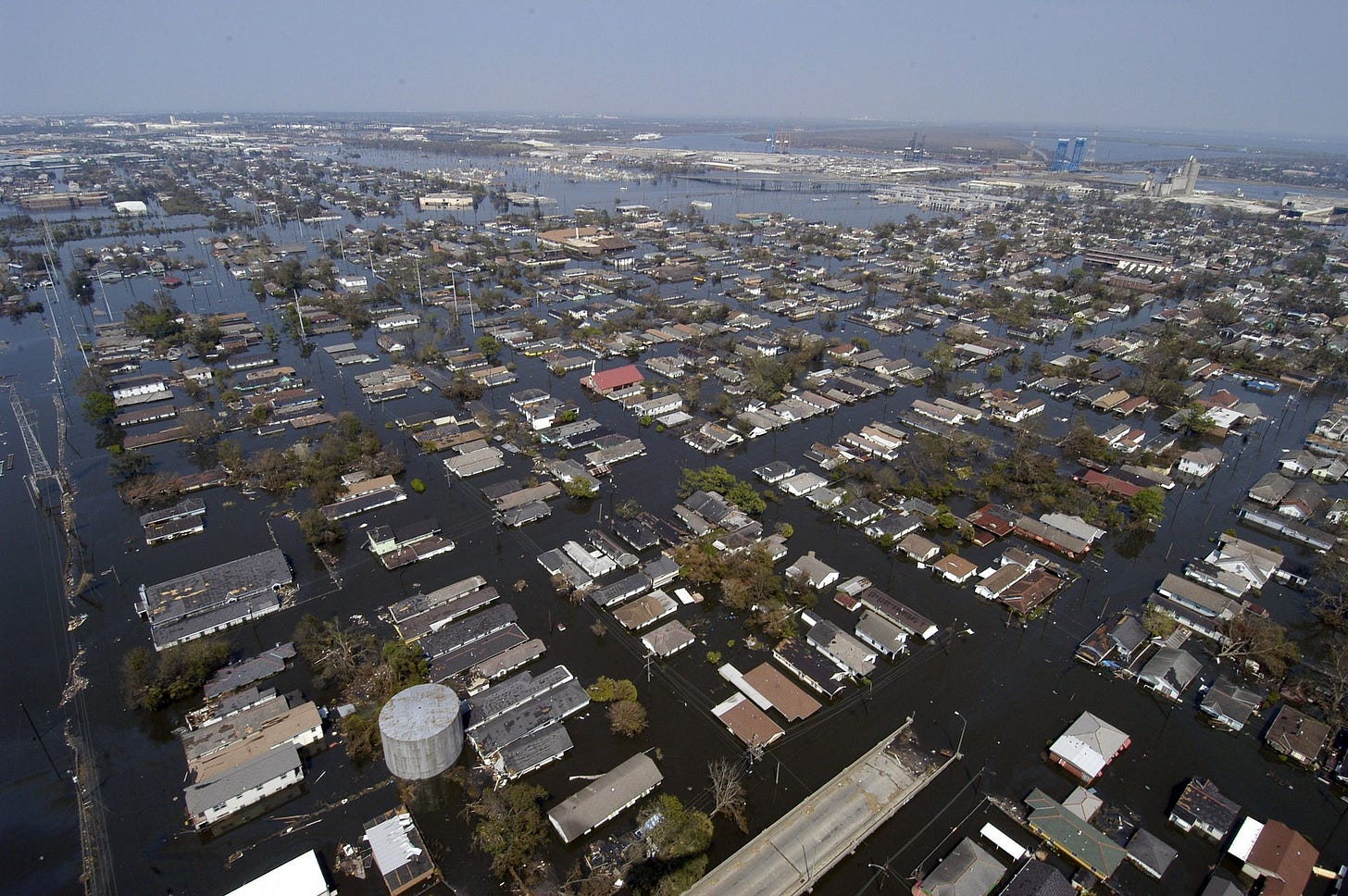We’re livid. We march and wave placards: There is no Planet B! We’re rightfully, royally pissed, red-faced and hoarse from yelling.
“They — they!! — aren’t listening! They are ruining it for everyone!”
Who are “they” when we are pointing fingers at global mismanagement like the climate crisis? That’s easy. Evil, corrupt politicians and evil, greedy CEOs, working separately or in collusion, are our go-to bad guys for climate inaction.
If we can agree on that, the much harder question is “Why are they still in charge?” Harder still: “What ought to be in charge instead?”
To make it intentionally simple, I break it into two main human-made systems that have the power to get things done at a global scale.
“Government”, the whole international category of policy, politicians and nation states defending arbitrary borders, and
“Industry”, which captures markets, enterprise, business, trade and other global money-making and wealth creation.
While academia, non-profit groups, faith-based groups and even art might weigh in on global matters, government and industry drive the way society works. They police us. They feed us, some more than others.
To be fair, we agreed to this set up millennia ago to help us organize, create safety and share values, and put us to work. In that way, government and industry have done exactly as we have asked, even as these ancient systems met and punched through the limits of the planet to propel this status quo. That “overshoot” began perhaps with empire-building colonialism or, later, with the Industrial Revolution that mechanized the extraction of nature for wealth creation.
This is the system we inherited. Now, they!! do quite the opposite to helping us thrive. They disorganize, consolidate their power, put up fences and cement an existential threat.
Humanity’s global priorities have shifted, but the systems created to embody those priorities have not. Neither government nor industry is fixing the crisis at the scale we need. They!! are locked doors, immovable by angry, pounding fists.
Structurally, by bad design, government and industry lack the counterweights in this society to force a change in direction.
What we, as a species, want is no longer relevant. Regaining our agency in this crisis is a key driver of our Bank of Nature design initiative. We’re opening a third door that is neither government nor industry.
“This call may be recorded for quality assurance training”
If you are angry, you take your complaint to someone who can make it right. We’ve been on hold with customer service for decades, listening to muzak that drones out the 70 years of stern science warnings about society’s impacts on global climate. Where are the results? They — they!! — have made scant progress in eliminating the toxic societal behaviors that exacerbate those impacts – even when we all know what we all know.
Thousands marched in protest at the recent COP26 climate summit that featured, bewilderingly, Amazon’s corporate titan Jeff Bezos, among other tone-deaf government and corporate leaders feigning concern… for the 26th year. It is the ongoing charade of blah blah blah, to borrow from youth leader Greta Thunberg.
Can we finally acknowledge that, regardless of the volume of shaming, the solution to the existential threat created by government and industry is not going to come from government or industry?
Our challenge, at Bank of Nature, is to wave from the open door that leads to a feasible path toward climate security. We call that a proxy for nature powered by existing, vast stewardship funds.
“Please continue to hold”
It helps to apply some imagination.
As a perspective check, let’s pretend, just for a moment and by mustering all our humanness, to feel pity for governments and industries. They are, after all, in a terrible bind – squeezed between what they are designed to do historically and what modern moral outrage is asking them to do instead.
Yet neither has said, “Wait, we’re not the right systems for this job. Let’s figure out what else is better.”
As near-immortal organizing principles existing well beyond the average human’s lifespan, government and industry may be as deluded as the rest of us that they can meet the challenge. Even with the benefit of history, they!! continue to run the planet through the language of expansion: money and finance, war, growth, economy, markets, jobs, returns and yields, trade, competition, injustice and prosperity. Accelerated, human-caused climate change is nature’s response to the accumulated negative externalities of the efforts of governments and industries to grow through extraction.
Neither government nor industry is programmed for a more nuanced approach.
They say they will try to fix it, but that’s it. The concerns of the day-to-day global enterprise activities are already hard enough — like our neighbors with jobs and kids and bills and 401Ks who take their recycling to the transfer station in their Range Rovers.
Any efficiencies marketed and sold as sustainability gains are margin-boosting strategies we might otherwise expect from growth-minded systems of wealth creation. Placation efforts to quiet climate concerns amount to being “less bad” but still bad. Really, how are to expect the systems of government and industry, heartless mechanisms engineered to consolidate wealth and power for competitive national interests and shareholder value, to do anything more?
Saving the world is an expensive drain on economic growth and shareholder value. Saving the world isn’t really their job. So, might they be unfairly pushed into a role for which they have no interest, no reward, no solid constituency, no strategies at scale and no strong market-making narrative? Climate is a sad story that does not rally consumers or voters.
It’s rather like asking a sociopath to be compassionate. It’s just not what they do and it’s a mistake to expect them to go against their nature however they dress up the illusion of caring.
“Your expected wait time is…. 30 years.”
Society is incomplete. There, I’ve said it.
As Bank of Nature makes the case for a proxy for nature in our society, we need first to make the case that the society we have is incomplete. Until we see it as incomplete and act on filling the void, we will continue to put our faith in government and industry to lead us away from what all of us see: A planet increasingly hostile to life as we know it because of the way we live life as we know it.
It takes a lot to lift our heads enough to see that a third way is a long overdue societal amendment. We need a tie breaker… or something at least to challenge the collusion of government and industry to stall climate action. Human anger is not enough.
Early on, when society was forming as a way to organize communities, there was a decision in the dominant western European worldview to treat nature as a buffet or a divine right. The more you could extract from nature, the richer you became. At the time, we might have thought nature was limitless. That’s not ignorance we can plead for the last many decades. In fact, we neglect the actual costs of extracting that prosperity from nature — what Bank of Nature calls “unpaid debts to nature”.
Governments and industries were not built to contain themselves for the sake of the environment, they were built to conquer it. Bank of Nature’s big idea is to create a third option built to defend it.
“We value your business… [click, dial tone]”
Think, imaginatively, of it another way. Betrayal of trust.
There is no shortage of relationship advice for people stung, often repeatedly, by putting their trust in the wrong people. Misplaced trust leads to heartbreak.
“Stop believing the bullshit, and pay attention to actions instead,” asserts one self-help blog with timeless advice for the betrayed, along with the added zinger, “Stop trying to force something that’s clearly not there.” Another warns that, when it comes to unworthy cads, “We hand over our power and skip the due diligence we need to do, to ensure this is a good move.”
I hear that as climate advice. It’s not a leap to acknowledge that we are duped into believing that government and industry, separately or in concert, have our long-horizon best interests in mind. They clearly don’t at scale. Presently, the climate crisis is a growth sector and continuing the crisis creates more opportunity for growth, regardless of the cost to human and non-human life. Until it doesn’t. We can’t hope that they!! will change their efforts until the climate crisis actually makes a dent in economic growth and shareholder value. Then we’ll see real action when climate change mitigation creates a better return.
There are, of course, many examples of conscientious policy and enterprise. However, to paraphrase Paul Hawken’s damning one liner in The Ecology of Commerce way back in 1993, every company in the world could be as woke as Ben & Jerry’s and we’d still be doomed. He called it a design problem, which Bank of Nature has now taken on as our challenge. To quote Patagonia’s former CEO Yvon Chouinard way back in 2013, 20 years later, "If these Fortune 500 companies are now cleaning up their act, then why is the world still going to hell? The elephant in the room is growth. Not one public company will voluntarily restrict growth to save the planet.”
We don’t fire them from the job because there is no other option, yet, by bad design.
Where do I see this conflict of interest? Banks. One on hand, they create ESG funds that package securitized investments that are nominally about environmental and social justice, but trade on share price like any investments in the capital markets. This caters to a growing customer base that wants to contribute to a climate and social justice solution without actually demanding one and whose growing nest eggs are still heading to be boiled. One the other hand, banks and debt are the bulk of funding for new oil and gas exploration and extraction.
Government and industry may be positioned as protectors, but they are the very factors creating our need for protection. For people in abusive relationships, the first and maybe scariest thoughts are not whether to leave, but how to leave.
Where will I go? How will I live? What about the kids? Will they!! come after me?
We have misplaced trust in a system that is not designed to deliver on that trust.
“Please listen closely as our options have changed”
At Bank of Nature, we talk a lot about trust, specifically as the key to open that third door.
As a term in legalese, a trust is a pool of savings managed on behalf of the owners by a trustee, someone with the fiduciary duty to ensure the long-term health of that fund. Fiduciaries are people in whom we trust to manage the holdings of a trust. That’s their one job and obligation or they are in a breach of trust. Bank of Nature argues that that obligation, fully executed, must extend to future generations living in a climate-changed future made dimmer by investments in industries today. That, in itself, changes the forecast for the better.
As a term in popular culture, we trust that the systems will take care of us – like idealized parents ought to, perhaps, even when administering medicines that make us gag. In this, I fear we have all been orphaned.
There is more relationship advice on ferreting out untrustworthiness in the people we might otherwise count on. They!!:
Lie to themselves and that is shown in the gap between what they say and what they do
Lack empathy
Are fickle
Punt responsibility to the people affected by their untrustworthiness.
How do you regard government and industry as stewards of a future made sustainable? Is there a safer alternative path that changes how they transact business and policy today? If we’re to achieve a future in which the world is already made sustainable and climate, among other pandemics, is wrangled in ways that eliminate the threat, are governments and industries your go-to heroes?
If they aren’t, one developing alternative is Bank of Nature supported by a very generous Arizona State University fellowship.
Bank of Nature is more than a metaphor, but an actual strategy to complete a system that is, in all the ways that matter, incomplete. A different metaphor might better inspire a look at what we are proposing.
We should be like water. When rising waters begin to flood and they come up against an immovable barrier, the water goes around. Water can find a crack in the obstacle and weave its way under the foundation or through pinholes to a bucket below. Water always finds a place to go. We should be like water.






